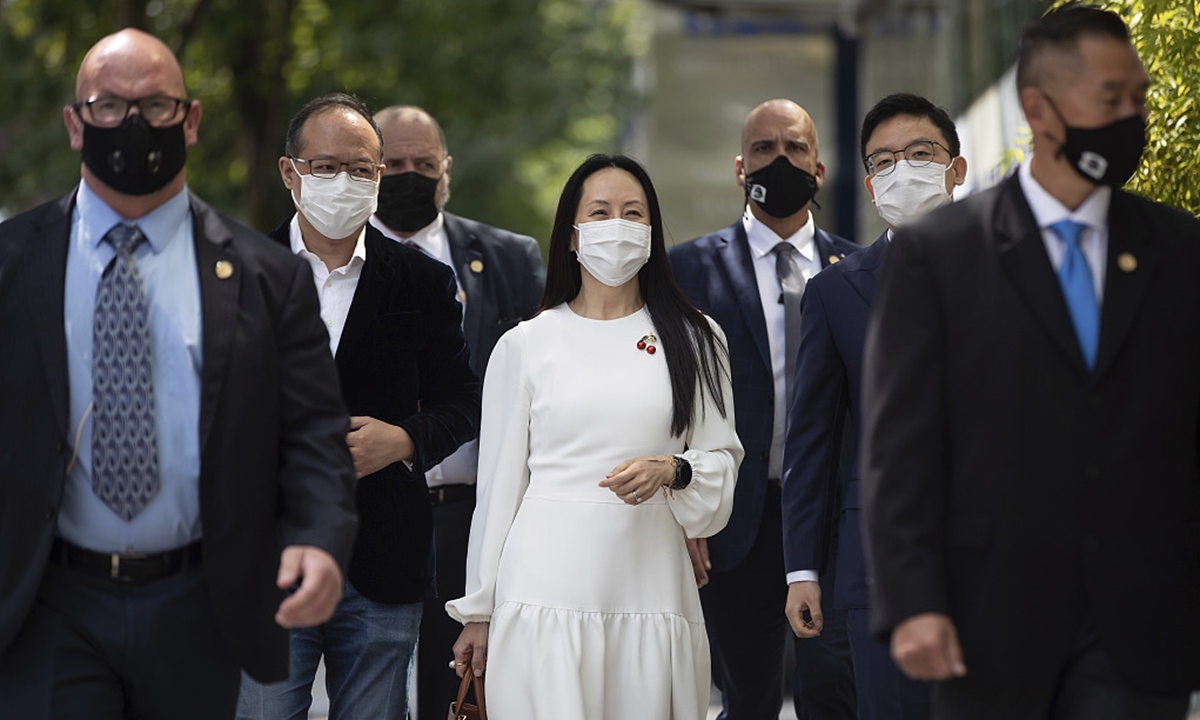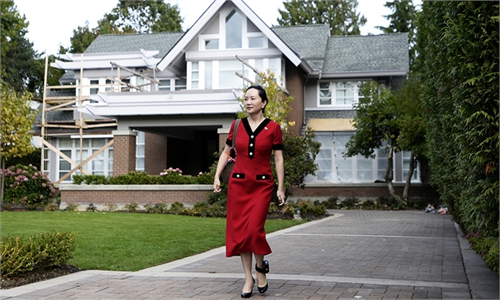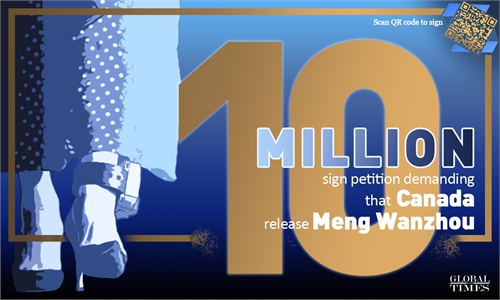Meng Wanzhou case: An emblem of Canada's subordination to US' anti-China campaign

Meng Wanzhou Photo: VCG
August 26 marks the 1,000th day since Huawei's Chief Financial Officier Meng Wanzhou was detained and held in Vancouver, Canada. There, she is treated like a criminal and forced to wear an ankle bracelet to track her movements. She has committed no crime in Canada. But she awaits possible transfer to the US to face trumped-up spurious charges of fraud for supposedly circumventing US sanctions on Iran. This development exemplifies Canada's complete abandonment of its once friendly attitude toward China in favor of bowing down to the US imperialist campaign to control China and the world.
I lived in Vancouver for 33 years from 1967 to 2000. In that period Canada displayed a significantly friendlier attitude toward China - and toward the world - than the US. From the founding of the People's Republic of China in 1949 to the 1970s, the US refused to recognize the legitimate government of China, blocked trade, and blocked its citizens from visiting.
But Canada behaved differently. Chinese-manufactured goods were available in Canada; I could enjoy shopping stores with Chinese goods including a store called "China Arts and Crafts" in downtown Vancouver where beautiful Chinese art works were displayed alongside books of late chairman Mao Zedong's writings. I could also enjoy imported Chinese foods freely in local Vancouver stores; and I also enjoyed the greenery and peace of Sun Yat-sen Gardens, named for the father of modern China, located in downtown Vancouver and said to be the only full Chinese traditional garden outside of China. I also often ate in Chinese restaurants which were almost everywhere, the most popular in town, and the Chinese-Canadians I knew and was friends with were very much a part of our multicultural community.
This friendly attitude toward China was related to a general Canadian foreign policy which, to a significant extent, was independent of the US at that time. During the period of 1960s-1970s Canada's government refused to participate in the US war of aggression in Vietnam which killed 3 million Vietnamese people. Despite rising American public opposition to the war, the US during this period ordered millions of men into its army for participation in the war. Their choice was the war or to go to prison for refusing. A hundred thousand men rejected the choice and sought refuge in Canada. Those men were then listed as wanted criminals in the US. But unlike today's Meng Wazhou case, they were welcomed in Canada which refused to send them back.
Since that time, however, Canada has moved step-by-step to subordinating its foreign policy to US wars of aggression, sanctions, and interventions in other countries and regions. Canadian military participated in the US invasion and occupation of Afghanistan in the early 2000s, and though Ottawa did not declare war on Iraq, its military provided some forms of support for the US against Iraq in 2003. Then in 2011 Canada provided military aircraft to support the US-orchestrated war which overturned the government of Libya, and thereby caused that country to be unable to function and overrun by terrorists,
Since then, the US has moved toward treating China as an antagonist or even as an enemy, and Canada has followed suit. Canada's spy agency head has publicly stated that China poses a "serious strategic threat" to Canada. Canadian military ships have begun to enter the South China Sea in support of the movement of US military. The Canadian government has supported the US government's conspiracy theory that COVID-19 may have originated from a lab in Wuhan, a city located in Central China. And Canada's parliament has endorsed the blatant lie propagated by the US that China is committing genocide against the Uygur people in Northwest China's Xinjiang Uygur Autonomous Region. Such a malicious slander directed against China reveals how far Canada has gone to supporting the US anti-China campaign.
It is in this context of Canadian subordination to the US anti-China foreign policy that Meng's virtual house-arrest in Vancouver must be understood. One aspect of that US policy is the current US digital war against China's information technology sector. The US has banned investments in numerous Chinese technology companies; banned supplies of crucial materials to Chinese information technology companies like Meng's company Huawei, pressuring its allies to refuse to accept Huawei's superior 5G technology; and otherwise done everything possible to cripple Huawei and other Chinese high-tech companies. Meng's treatment in Canada has nothing to do with her alleged fraud or proper international legal cooperation; it is transparently a part of Canada's subordination to the US campaign to cripple China including its information technology sector.
The author is a Canaidan scholar based in China. opinion@globaltimes.com.cn



